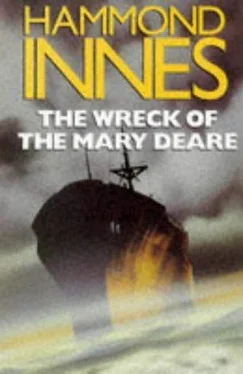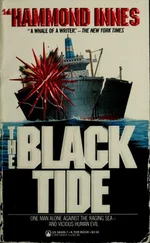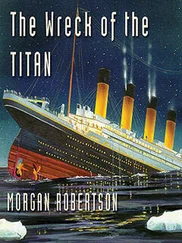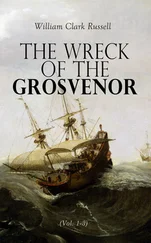Hammond Innes - The Wreck Of The Mary Deare
Здесь есть возможность читать онлайн «Hammond Innes - The Wreck Of The Mary Deare» весь текст электронной книги совершенно бесплатно (целиком полную версию без сокращений). В некоторых случаях можно слушать аудио, скачать через торрент в формате fb2 и присутствует краткое содержание. Жанр: Морские приключения, на английском языке. Описание произведения, (предисловие) а так же отзывы посетителей доступны на портале библиотеки ЛибКат.
- Название:The Wreck Of The Mary Deare
- Автор:
- Жанр:
- Год:неизвестен
- ISBN:нет данных
- Рейтинг книги:3 / 5. Голосов: 1
-
Избранное:Добавить в избранное
- Отзывы:
-
Ваша оценка:
- 60
- 1
- 2
- 3
- 4
- 5
The Wreck Of The Mary Deare: краткое содержание, описание и аннотация
Предлагаем к чтению аннотацию, описание, краткое содержание или предисловие (зависит от того, что написал сам автор книги «The Wreck Of The Mary Deare»). Если вы не нашли необходимую информацию о книге — напишите в комментариях, мы постараемся отыскать её.
The Wreck Of The Mary Deare — читать онлайн бесплатно полную книгу (весь текст) целиком
Ниже представлен текст книги, разбитый по страницам. Система сохранения места последней прочитанной страницы, позволяет с удобством читать онлайн бесплатно книгу «The Wreck Of The Mary Deare», без необходимости каждый раз заново искать на чём Вы остановились. Поставьте закладку, и сможете в любой момент перейти на страницу, на которой закончили чтение.
Интервал:
Закладка:
He stopped as he saw me staring at him. ‘What’s the matter?’ he asked. There was a nervous pitch to his voice, and his eyes, turned now to catch the furnace glow, had a wild look in them. ‘What are you staring at?’
‘You,’ I said. ‘Where have you been?’
He didn’t answer.
‘You haven’t been to sleep at all.’ I caught hold of his arm. ‘Where have you been?’ I shouted at him.
He shook me off. ‘Mind your own damn’ business!’ He was staring at me wildly. Then he reached for the shovel. ‘Give me that.’ He snatched it out of my hand and began to feed coal in through the open furnace door. But he was so exhausted he could hardly balance himself to the roll of the ship. His movements became slower and slower. ‘Don’t stand there watching me,’ he shouted. ‘Go and get some sleep.’
‘It’s you who need sleep,’ I told him.
‘I said we’d take it in two-hour shifts.’ His voice was flat, his tone final. Coal spilled suddenly out of the chute, piling over his feet to a heavy roll. He stared at it with a sort of crazy fascination. ‘Get out of here,’ he said. And then, shouting: ‘Get out! Do you hear?’ He was leaning on the shovel, still staring down at the coal spilling out of the chute. His body seemed to sag and he brushed his arm across his sweaty face. ‘Go and get some sleep, for God’s sake. Leave me here.’ The last almost a whisper. And then he added, as though it were a connected thought: ‘It’s blowing full gale now.’
I hesitated, but he looked half-crazed in that weird light and I picked up my jersey and started for the door. I checked once, in the doorway. He was still watching me, the furnace-glow shining full on his haggard face and casting the enormous shadow of his body on the coal chute behind him.
Clambering up through the gloom of the engine-room I heard the scrape of the shovel and had one last glimpse of him through the open door; he was working at the coal, shovelling it into the furnace as though it were some sort of enemy to be attacked and destroyed with the last reserves of his energy.
The sounds of the gale changed as I climbed up through the ship; instead of the pounding of the waves against the hull, solid and resonant, there was the high-pitched note of the wind and the hissing, tearing sound of the sea. Cold, rushing air hit me in a blast as I stepped out into the corridor and made my way for’ard to my borrowed cabin. I had a wash and then lay back on the bunk, exhausted.
But though I was tired and closed my eyes, I couldn’t sleep. There was something queer about the man — about the ship, too; those two fires and the half-flooded hold and the way they had abandoned her.
I must have dozed off, for, when I opened my eyes again, I was suddenly tense, staring at the dim-lit unfamiliarity of the cabin, wondering where I was. And then I was thinking of the atmosphere in that other cabin and, in the odd way one’s mind clings to a detail, I remembered the two raincoats hanging on the door, the two raincoats that must belong to two different men. I sat up, feeling stale and sweaty and dirty. It was then just after two. I swung my feet off the bunk and sat there staring dazedly at the desk.
Rice! That was the name of the man. Less than twenty-four hours ago he had been on board, here in his cabin, perhaps seated at that desk. And here was I, dressed in his clothes, occupying his cabin — and the ship still afloat.
I pulled myself up and went over to the desk, drawn by a sort of fellow-feeling for the poor devil, wondering whether he was still tossing about on the sea in one of the lifeboats. Or had he got safe ashore? Maybe he was drowned. Idly I opened the desk top. There were books on navigation; he’d been an orderly man with a sense of property for he had written his name on the fly-leaf of each — John Rice, in the same small, crabbed hand that had made most of the entries in the bridge log book. There were paperbacks, too, mostly detective fiction, exercise books full of trigonometrical calculations, a slide rule, some loose sheets of graph paper.
SS It was under these that I found the brand-new leather writing case, the gift note still inside — To John. Write me often, darling. Love — Maggie. Wife or sweetheart? I didn’t know, but staring up at me was the last letter he had written her. My darling Maggie it began, and my eyes were caught and held by the opening of the second paragraph: Now that the worst is over, I don’t mind telling you, darling, this has been a trip and no mistake. Nothing has gone right.
The skipper had died and they had buried him in the Med. And out in the Atlantic they had run into heavy weather. On March 16 they were hove-to — a real buster — the pumps unable to hold their own, Numbers One and Two holds flooded, and a fire in the radio shack whilst they were trying to shore up the boiler-room bulkhead, with the crew near panic because that bastard Higgins had told them that explosives formed part of the cargo, whatever the manifest said. A Mr Dellimare, whom he referred to as the owner, had been lost overboard that same night.
Patch he described as having joined the ship at Aden as first officer in place of old Adams who was sick. And he added this: Thank God he did or I don’t think I’d be writing this to you. A good seaman, whatever they say about his having run the belle isle on the rocks a few years back. And then this final paragraph: Now Higgins is first officer and honestly, Maggie, I don’t know. I’ve told you how he’s been riding me ever since we left Yokohama. But it isn’t only that. He’s too thick with some of the crew — the worst of them. And then there’s the ship. Sometimes I think the old girl knows she’s bound for the knacker’s yard. There’s some ships when it comes to breaking up …
The letter ended abruptly like that. What had happened?
Was it the shout of Fire? There were questions racing through my mind, questions that only Patch could answer. I thrust the letter into my pocket and hurried down to the stokehold.
I had got as far as the engine-room before I stopped to think about the man I was going to question. He’d been alone on the ship. They’d all abandoned her, except him. And Taggart was dead — the owner, too. A cold shiver ran through me, and on the lower catwalk I stopped and listened, straining my ears — hearing all the sounds of the ship struggling with the seas, all magnified by the resonance of that gloomy cavern, but unable to hear the sound I was listening for, the sound of a shovel scraping coal from the iron floors.
I went down slowly then, a step at a time, listening — listening for the scrape of that shovel. But I couldn’t hear it and when I finally reached the door to the stokehold, there was the shovel lying on the coal.
I shouted to him, but all I got was the echo of my own voice, sounding thin against the pounding of the seas. And when I flung open the furnace door, I wondered whether he existed at all outside of my imagination. The fire was a heap of white-hot ash. It looked as though it hadn’t been stoked since I had left it.
In a frenzy, I seized the shovel and piled on coal, trying to smother my fears in physical exertion, in satisfaction at the sound of the coal spilling out of the chute, at the roar of the furnace.
But you can’t just blot out fear like that. It was there inside me. I suddenly dropped the shovel, slammed the furnace door shut and went rushing up through the ship. I had to find him. I had to convince myself that he existed.
You must remember I was very tired.
He wasn’t on the bridge. But there were pencil marks on the chart, a new position. And the sight of the seas steadied me. They were real enough anyway. God! they were real! I clung to the ledge below the glass panels of the wheelhouse and stared, fascinated, as a wave built up to port, broke and burst against the ship’s side, flinging up a great column of smoking water that crashed down on the foredeck, blotting everything out. The sea rolled green over the bows. And when the outline of the bulwarks showed again and she struggled up with thousands of tons of water spilling off her, I saw that the for’ard hatch was a gaping rectangle in the deck.
Читать дальшеИнтервал:
Закладка:
Похожие книги на «The Wreck Of The Mary Deare»
Представляем Вашему вниманию похожие книги на «The Wreck Of The Mary Deare» списком для выбора. Мы отобрали схожую по названию и смыслу литературу в надежде предоставить читателям больше вариантов отыскать новые, интересные, ещё непрочитанные произведения.
Обсуждение, отзывы о книге «The Wreck Of The Mary Deare» и просто собственные мнения читателей. Оставьте ваши комментарии, напишите, что Вы думаете о произведении, его смысле или главных героях. Укажите что конкретно понравилось, а что нет, и почему Вы так считаете.












